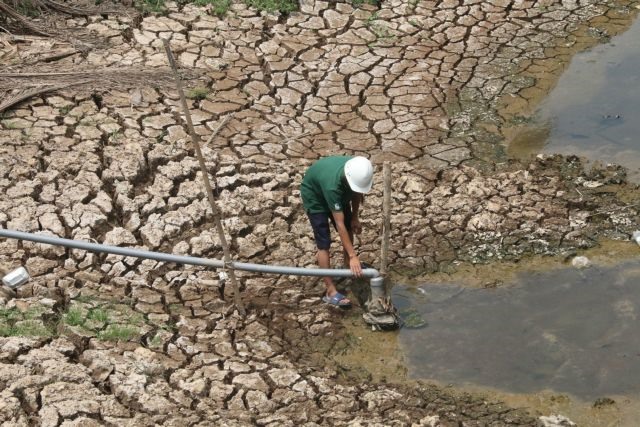.jfif) Opinion
Opinion

Nguyễn Văn Tỉnh, director general of the Department of Water Resources, speaks to Nông Nghiệp Việt Nam (Việt Nam Agriculture) newspaper about Prime Minister Nguyễn Xuân Phúc’s decision to grant VNĐ500 billion to control salt water intrusion in eight Mekong Delta provinces

|
A farmer tries to pump the little freshwater remaining in the Gò Công canal, Mekong Delta Province of Tiền Giang. — VNA/VNS Photo Minh Trí
Nguyễn Văn Tỉnh, director general of the Department of Water Resources, speaks to Nông Nghiệp Việt Nam (Việt Nam Agriculture) newspaper about Prime Minister Nguyễn Xuân Phúc’s decision to grant VNĐ500 billion to control salt water intrusion in eight Mekong Delta provinces
What is being done to help farmers in the Mekong Delta enjoy a bumper Autumn-Spring rice crop this year?
In June 2019, the Ministry of Agriculture and Rural Development (MARD) ordered all its affiliated agencies to compile reports on the water resources in their localities, particularly those in the Mekong Delta region. Based on their reports, we have developed various scenarios on how to cope with water shortages in the 2019-2020 dry season.
According to weather forecasts, the dry season this year will come earlier than in previous years, and MARD has recommended that Mekong Delta farmers start their 2019-2020 Winter-Autumn crops earlier than usual. Some 1.3 million out of 1.54 million hectares of the Autumn-Spring rice crop have already been harvested.
Thanks to this advice, Mekong Delta farmers have harvested a bumper Autumn-Spring crop. Coupled by that the rice paddy price in the region has recently gone up which has made the farmers happy.
What has MARD and concerned agencies done to help farmers in the Mekong Delta to co-exist with salt water?
The Prime Minister’s Decision to give VNĐ 130 billion to the eight localities hardest hit by salt water intrusion has helped farmers in the region.
In 2015-2016, Mekong farmers were also hit by serious drought. The Government and MARD have asked local authorities and farmers to build a dozen irrigation projects all over the Mekong Delta. Luckily, five projects had been completed and started operations last December and early January this year. These projects have also helped control salt water intrusion for 83,000ha while supporting some 3,000 ha which were seriously hit by drought.
It is expected that by 2030, salt water intrusion will be under control in the Mekong Delta region, even when there is extreme weather.
Will you please tell us about the most successful projects in the fight against drought and salt water intrusion?
In the period under review, some 96,000 households didn’t have sufficient fresh water for daily use. We decided to launch a mass communications campaign to encourage enterprises and people to donate money and other resources to supply fresh water to people living in areas which were seriously hit by drought and salt water intrusion.
Besides, with lessons learned from drought and salt water intrusion in 2015-2016, many households now have other means to store water in the dry season, including ponds and wells.
Thanks to these initiatives, many households have sufficient fresh water to use in the dry season. — VNS




